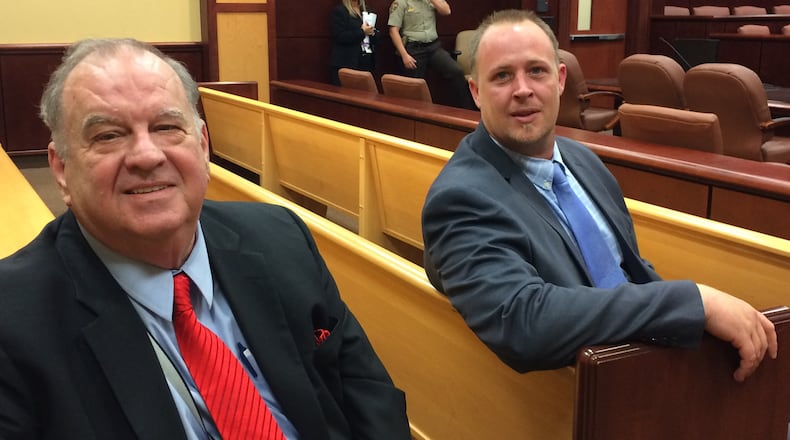The publisher and attorney for the now-closed Fannin Focus weekly newspaper have filed a federal lawsuit against the chief judge in the Appalachian Judicial Circuit for allegedly orchestrating their "malicious" jailing and prosecution after they sought court spending records.
Mark Thomason, who closed the Fannin Focus four months after he was arrested in June 2016, and Hiwassee lawyer Russell Stookey are seeking an unspecified amount in damages for the humiliation and the loss of business they suffered after the case received nationwide news coverage. Last year, they asked for $1 million in a demand letter sent to Appalachian Judicial Circuit Chief Superior Court Judge Brenda Weaver, the district attorney, and Pickens County, where they were indicted.
Both men have said their arrests damaged their reputations, forced Thomason to shut down the Fannin Focus newspaper and damaged Stookey's law practice.
“We’re almost two years after the fact of being arrested and multiple times throughout every day I’m still living with the aftermath, whether it be somebody asking about it or the lawsuit being filed to bring the truth to light… (or) trying to explain to someone who has doubts in their heads as to whether this guy is a fraud and a thief,” said the former publisher Thomason, who now earns a living in construction.
MORE: Drug tests continue for newspaper publisher despite DA plans to drop case
RELATED: How a Georgia judge spent money from operating accout
The 19-page lawsuit filed Monday in U.S. District Court in Gainesville also alleges that Weaver pressured the district attorney and members of the grand jury to return a felony indictment against the two men.
Ultimately, the grand jury indicted Thomason for making a false statement when he wrote in a formal request for records that he was seeking copies of checks written on a court bank account that Weaver controlled that were “illegally” cashed. The grand jury also indicted Thomason and Stookey on a charges of identity fraud and attempted identity fraud because they had secured a subpoena for bank records for a related court case.
Weaver did not respond to text and emailed requests for comment but she has previously denied doing anything wrong. The Judicial Qualifications Commission, which Weaver once chaired, cleared her of any wrongdoing in September and sharply criticized Thomason for pursuing a story because of his "personal dislike of the judge."
“This case is quite unusual,” said Gerry Weber, one of the three attorneys who are representing Thomason and Stookey. “A judge (was) using their powers as a judge to (carry out) a personal vendetta against a newspaper for investigating stories she didn’t want to be told. I think it’s going to be a long, hard fought-out case.”
Thomason has said he was attempting to report on his suspicions of corruption in the Appalachian Judicial Circuit, which includes the North Georgia counties of Fannin, Pickens and Gilmer.
Tensions between Thomason and the local court began in 2015 when Thomason tried to get the court reporter’s audio recordings of a proceeding during which now-retired Judge Roger Bradley made a racial slur. Thomason sued court reporter Rhonda Stubblefield and she in turned sued Thomason, claiming he defamed her when he suggested she had changed her transcription of the courtroom exchanges so that the slur was not included.
Both dropped their cases against the other, but then Stubblefield sued Thomason to recoup her legal expenses. That disagreement led to Stookey securing a subpoena for court records that would show Weaver had already reimbursed Stubblefield for her legal costs with money from a court fund. At the same time, Thomason had asked Pickens County for copies of cancelled checks drawn on Weaver’s and Bradley’s accounts, after he was tipped off that some expenditures had been improper. Thompson had written in his records request he was looking copies of checks that were cashed “illegally.”
According to Monday’s lawsuit, “Judge Weaver was enraged and personally offended by the public records request, and sought revenge on Thomason and Stookey as a result of their attempts to investigate whether she had misappropriated public funds.”
Weaver had her law clerk research what crimes the pair could be charged with and she gave District Attorney Alison Sosebee the names of people to question before the grand jury because they were “out to get her,” the suit said.
“Judge Weaver and her husband, George Weaver, were angry about articles being published by Thomason in the Fannin Focus, and Thomason’s attempt to investigate the misuse of public funds,” the suit said. “Judge Weaver took steps to ensure the arrest of both Thomason and Stookey in spite of there being no reasonable basis to initiate a criminal prosecution against them.”
The complaint said the grand jury meeting on June 24, 2016, initially declined to indict Thomason and Stookey. "Upon learning of the grand jury's failure to indict Thomason and Stookey, Weaver improperly influenced Sosebee and several grand jurors in the hallway of the courthouse, outside of the of the grand jury proceedings to return a true bill," the lawsuit said.
An indictment was returned and hours later Stookey and Thomason were arrested.
The FBI opened an investigation into circumstances that led to the charges. The federal investigation was eventually closed without charges.
Facing criticism from lawyers' groups and national media organizations and at Weaver's urging, Sosebee dropped the charges against Thomason and Stookey on July 18, 2016.
About the Author
The Latest
Featured


